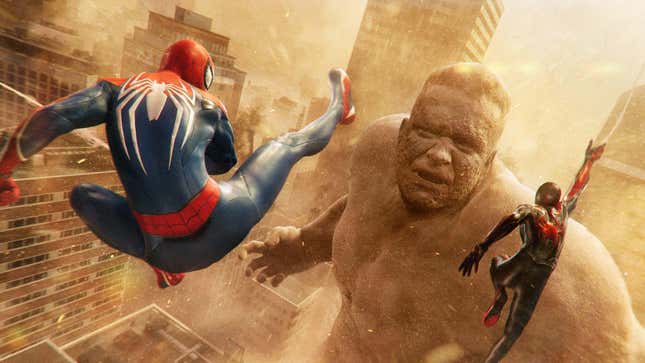
Every Friday, A.V. Club staffers kick off the weekend by taking a look at the world of gaming, diving in to the ideas that underpin the hobby we love with a bit of Game Theory. We’ll sound off in the space above, and invite you to respond down in the comments, telling us what you’re playing this weekend, and what theories it’s got you kicking around.
Before we get into the ludology today, a quick programming note: As you may have noticed, we’ve changed up the title of this weekly column (but not its intent); the goal is to keep talking—and inviting you to talk in the comments—about what you, and we, have been playing of late, and why… but without having to jam a six-word headline into every piece. Hence, Game Theory!
Anyway: With its release of Marvel’s Spider-Man 2 today (read our review here), Insomniac Games has codified something that’s been true since at least their original 2018 game, and probably for quite a lot longer: Spider-Man—whether Peter Parker or Miles Morales—is gaming’s best superhero.
To be fair, it’s not an especially crowded pack. The only real competition is Batman, over at the Distinguished Competition—and even then, we’re only really talking about Rocksteady’s Arkham games, the only titles to have ever successfully merged the character’s “Hit mentally ill people until they stop trying to blow up the city” aspects with his more cerebral elements. Superman, meanwhile, has fared infamously poorly in gaming; most of the X-Men’s efforts have been a mess (give or take the X-Men Legends action-RPGs that begat the more wide-ranging Marvel’s Ultimate Alliance series); and while the Incredible Hulk has one genuinely good game to his name, his pals in the Avengers strongly whiffed on their one big attempt at gaming supremacy. Spidey simply stands/swings above.
In looking at Spider-Man 2, it’s easy to tease out why Pete and Miles are so, well, amazing at being translated into video games: Their strengths, as heroes, dovetail almost perfectly with those things that gaming does best. Above all else, that means a shared interest in the joy of movement. No other hero (even, ironically, the Flash) more perfectly captures how good it can feel to move across a big, complicated cityscape; half the pleasure of Sony’s fantastic Spider-Verse movies is in seeing neophyte spider Miles acclimate to his ability to gracefully navigate space. And ever since gaming tech got good enough—with 2004 Sam Raimi movie tie-in Spider-Man 2, of all things—to put actual web-swinging in players’ hands, the character has soared above the competition. (In the new Spider-Man 2, that even includes ripping off Batman a bit, incorporating Arkham City’s gliding mechanics into Pete and Miles’ bag of aerial tricks.) “Navigating space” is one of those sensations gaming does better than any other artistic medium, and so our most agile superhero has thrived in the form.
But Spider-Man’s weaknesses are just as vital to his gaming success. Part of the appeal of the character has always been that, underneath the mask and the quips, he’s just a kid from Queens and/or Harlem: When Spidey gets hit, he gets hit hard. The character can scale up to cosmic combat or kaiju battles when Marvel needs him to, but part of the reason he’s always endured, from a writing point of view, is that it’s easy to come up with daunting problems for him without completely breaking the universe in half. One of the great things about Insomniac’s Spider-Man games, meanwhile, is that they grasp that a single goon with a gun getting the drop on him can still be a lethal threat to a guy who’s tough, but not bulletproof: a little fragility can go a long way in making a gaming protagonist work.
It’s those two sides of Spider-Man that make him gaming’s ultimate superhero. On the one hand, is the sheer pleasure of being him, swinging above city streets, webbing up the baddies, thinking through problems with a joke flying every few seconds. And on the other, are the overwhelming odds he’s almost always facing, hordes of criminals and larger-than-life villains. (It’s not for nothing that gaming protagonists have always tended to be the little guy dodging hits from bigger, slower opponents, dating back to Mario and Bowser and beyond; far more satisfying to be the nimble David than the lumbering Goliath.) Other heroes might have flashier moves, darker stories, more gadgets in their bags of tricks. But no other hero feels so amazingly good to play.